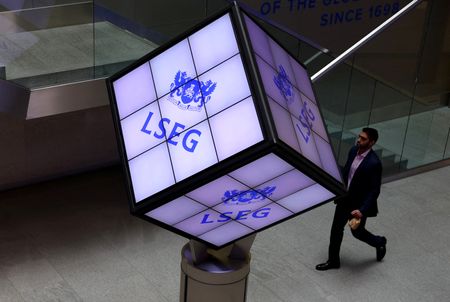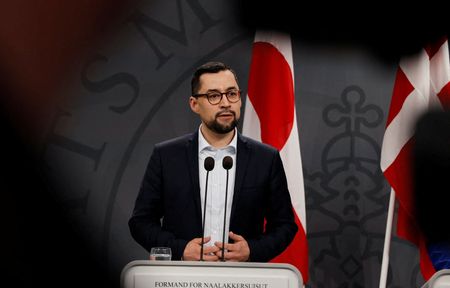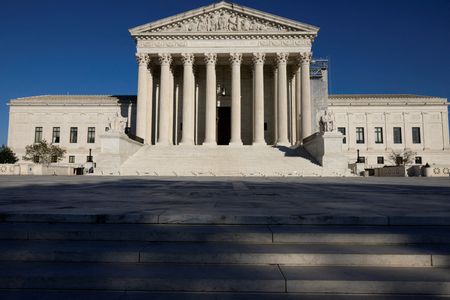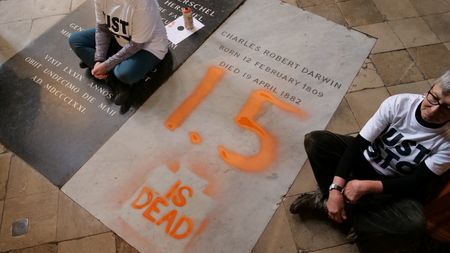By Laila Bassam and Tom Perry
BEIRUT (Reuters) -Lebanese President Joseph Aoun summoned Nawaf Salam, the head of the International Court of Justice, to designate him prime minister after most lawmakers nominated him on Monday, a big blow to Hezbollah, which accused opponents of seeking to exclude it.
The choice of Salam underlined the major shift in the power balance among Lebanon’s sectarian factions since the Iran-backed Shi’ite group Hezbollah was pummelled in a war with Israel last year, and its Syrian ally Bashar al-Assad was toppled.
The presidency said Salam, currently outside the country and due to return on Tuesday, had secured the backing of 84 out of parliament’s 128 lawmakers, and Aoun had summoned him to assign him to form the government.
Salam won backing from Christian and Druze factions, and prominent Sunni Muslim MPs, including Hezbollah allies.
But lawmakers from Hezbollah and its Shi’ite ally the Amal Movement, which hold all the seats reserved for Shi’ites in parliament, did not name anybody, indicating they currently do not intend to participate in Salam’s government.
Senior Hezbollah lawmaker Mohammed Raad, whose Iran-backed group had wanted incumbent Najib Mikati to stay in the post, said Hezbollah’s opponents were working for fragmentation and exclusion. He said the group had “extended its hand” by electing Joseph Aoun as president last week only to find the “hand cut”.
Last week’s election of army commander General Aoun, who enjoys the support of the United States and Saudi Arabia, was another sign of shifts in the political landscape, in which Hezbollah had long held decisive sway.
Aoun, a Maronite Christian, held consultations over the choice of prime minister with parliament’s 128 lawmakers on Monday. He is obliged to pick the candidate with the greatest number of votes.
The prime minister must be a Sunni Muslim according to Lebanon’s sectarian power-sharing system, which parcels out state positions on the basis of religious affiliation. The presidency goes to a Maronite Christian and the speaker of parliament must be a Shi’ite Muslim.
Hezbollah lawmakers attended their meeting with Aoun later than scheduled, delaying their arrival as they saw the momentum building behind Salam, a Hezbollah source said.
Hezbollah believed a political understanding had been reached on Mikati’s election before the group agreed to elect Aoun last week, the source said.
CHALLENGES AHEAD
Sunni and Christian allies of Hezbollah were among those who named Salam. Faisal Karami, a Sunni lawmaker aligned with the group, said he had nominated Salam, citing demands for “change and renewal” and Arab and international support for Lebanon.
Aoun’s election and the designation of a new premier are steps towards reviving Lebanese government institutions which have been paralysed for more than two years, with the country having neither a head of state nor a fully empowered cabinet.
The new administration faces huge tasks including rebuilding areas levelled by Israeli airstrikes during the war with Hezbollah, and launching long-stalled reforms to revive the economy and address the root causes of the collapse of Lebanon’s financial system in 2019.
In his former role as commander of the U.S.-backed army, Aoun played a critical role in the implementation of a U.S.-brokered ceasefire deal between Israel and Hezbollah.
The terms require the Lebanese army to deploy into south Lebanon as Israeli troops and Hezbollah withdraw forces.
Raad said Hezbollah would follow the next steps, and “proceed with calm and wisdom, out of concern for the national interest, and we will see their actions … to expel the occupier from our land”.
(Reporting by Laila Bassam, Tom Perry, Maya Gebeily in Beirut, Clauda Tanios and Tala Ramadan in Dubai; Writing by Tom Perry, Editing by Timothy Heritage, William Maclean)











